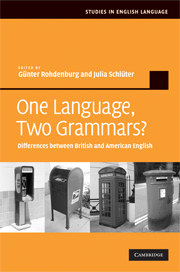Book contents
- Frontmatter
- Contents
- List of figures
- List of tables
- List of contributors
- Introduction
- 1 Colonial lag, colonial innovation or simply language change?
- 2 Compound verbs
- 3 The formation of the preterite and the past participle
- 4 Synthetic and analytic comparatives
- 5 Phonology and grammar
- 6 Prepositions and postpositions
- 7 Argument structure
- 8 Reflexive structures
- 9 Noun phrase modification
- 10 Nominal complements
- 11 Non-finite complements
- 12 The present perfect and the preterite
- 13 The revived subjunctive
- 14 The mandative subjunctive
- 15 The conditional subjunctive
- 16 Tag questions
- 17 The pragmatics of adverbs
- 18 How different are American and British English grammar? And how are they different?
- 19 New departures
- Bibliography
- Index
9 - Noun phrase modification
Published online by Cambridge University Press: 03 July 2009
- Frontmatter
- Contents
- List of figures
- List of tables
- List of contributors
- Introduction
- 1 Colonial lag, colonial innovation or simply language change?
- 2 Compound verbs
- 3 The formation of the preterite and the past participle
- 4 Synthetic and analytic comparatives
- 5 Phonology and grammar
- 6 Prepositions and postpositions
- 7 Argument structure
- 8 Reflexive structures
- 9 Noun phrase modification
- 10 Nominal complements
- 11 Non-finite complements
- 12 The present perfect and the preterite
- 13 The revived subjunctive
- 14 The mandative subjunctive
- 15 The conditional subjunctive
- 16 Tag questions
- 17 The pragmatics of adverbs
- 18 How different are American and British English grammar? And how are they different?
- 19 New departures
- Bibliography
- Index
Summary
Introduction
Written registers in English have undergone extensive stylistic change over the past four centuries, in response to changes in the purposes of communication, the demographics of the reading public and attitudinal preferences of authors. For example, Biber and Finegan (1989, 1997) document the way in which written prose registers in the seventeenth century were already quite different from conversational registers, and how those registers evolved to become even more distinct from speech over the course of the eighteenth century.
Informational expository registers like medical prose and science prose have continued to develop more ‘literate’ styles over the last two centuries, including increasing use of passive verbs, relative clause constructions and elaborated noun phrases generally (see Atkinson 1992, 2001, Biber 1995: 280–313, Biber and Finegan 1997). These linguistic developments correspond to the development of a more specialized readership, more specialized purposes, and a fuller exploitation of the production possibilities of the written mode. That is, in marked contrast to the general societal trends towards a wider lay readership and the corresponding need for popular written registers, readers of medical research prose and science prose have become increasingly more specialized in their backgrounds and training, and correspondingly these registers have become more specialized in linguistic form. Surprisingly, even some more ‘popular’ registers, such as newspaper reportage, have followed a similar historical path (see Biber 2003).
One linguistic domain that reflects these historical developments is the choice among structural devices used to modify noun phrases.
- Type
- Chapter
- Information
- One Language, Two Grammars?Differences between British and American English, pp. 182 - 193Publisher: Cambridge University PressPrint publication year: 2009
- 11
- Cited by



